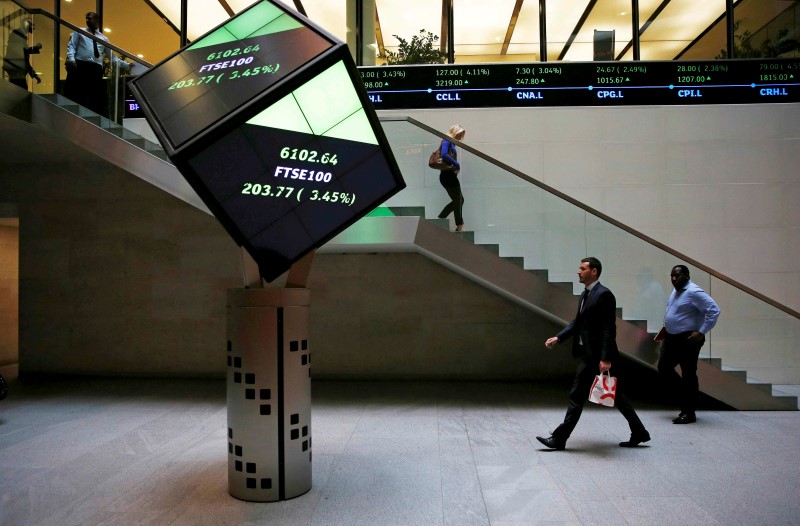By Nigel Stephenson
LONDON (Reuters) - Global stocks hit their highest in almost a year on Monday as investors pared back expectations of when U.S. interest rates would rise, although a fall in bank shares after stress tests took the shine off European shares.
Wall Street, however, looked set to open higher, according to index futures, potentially giving another nudge up to MSCI's world stocks index (MIWD00000PUS), which touched its highest level since mid-August 2015 before pulling back slightly.
The dollar rose against the yen but held close to lows hit after weaker-than-expected U.S. growth numbers on Friday, putting the spotlight on monthly jobs data due later this week.
European shares initially rose but gave up its gains as banks turned broadly negative after Friday's release of stress tests on 51 European Union lenders.
The pan-European STOXX 600 index (STOXX) fell 0.6 percent, led lower by a 2 percent fall in the banks sub-index (SX7P).
Among the day's biggest losere were Italy's UniCredit (MI:CRDI), down 7.4 percent and Austria's Raiffeisen (VI:RBIV), down 6.5 percent.
Investor concerns had focused on Italy, whose banks are saddled with 360 billion euros of non-performing loans.
Italy's Monte dei Paschi (MI:BMPS), the world's oldest bank, fared among the worst in the stress tests but unveiled a rescue plan less than an hour before the results came out.
Its shares rose 4.5 percent on Monday and were among Europe's top gainers. Italian government bond yields (IT10YT=RR) hit 17-month lows.
For Reuters new Live Markets blog on European and UK stock markets see reuters://realtime/verb=Open/url=http://emea1.apps.cp.extranet.thomsonreuters.biz/cms/?pageId=livemarkets
MSCI's broadest index of Asia-Pacific shares outside Japan (MIAPJ0000PUS) rose 1.3 percent, hitting its highest level in about a year.
"Investors have been shifting money to Asia, which is likely to be least affected by Brexit and as the U.S. Fed appears to be in no hurry to raise interest rates," said Yukino Yamada, senior strategist at Daiwa Securities.
Factory activity data from China painted a mixed picture. The official Purchasing Managers' Index showed a surprise contraction in July but a private PMI was stronger than forecast and signaled the first expansion since February 2015.
Chinese shares <.CSI300> <.SSEC> fell to a one-month low on a regulatory crackdown on speculation.
Tokyo's Nikkei index (N225) closed up 0.4 percent, led by financials as the dollar fell against the dollar.
The yen, which soared on Friday after economic stimulus measures from the Bank of Japan disappointed investors and the U.S. growth data, fell 0.2 percent to 102.21 per dollar
Sterling
Britain voted on June 23 to leave the European Union, a move that drove sterling sharply lower.
"Action by the BoE is fully anticipated by the market, with the overnight swaps rate pointing to a cut of over 30 basis points being priced," said Derek Halpenny, European head of global market research at Bank of Tokyo-Mitsubishi UFJ.
The dollar index (DXY), which measures the greenback against a basket of major currencies, rose 0.1 percent, still close to Friday's lows. After the U.S. GDP numbers, the chance of a hike by year-end fell to about 33 percent, according to CME Fedwatch, down from about 50 early last week.
U.S. JOBS
Some analysts said data in the coming week, including U.S. payrolls on Friday, would be more supportive of the dollar.
U.S. Treasury yields edged up on Monday, reversing some of Friday's falls. Ten-year yields (US10YT=RR) rose 2 basis points to 1.48 percent. German 10-year yields
Oil prices reversed early gains adding ti July's 15 percent falls. Brent crude <.LCOc1>, the international benchmark, traded 61 cents lower at $42.92 a barrel.

With stocks in positive territory and the dollar stronger, gold